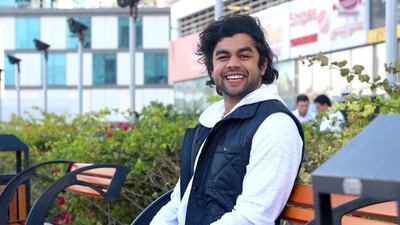Facebook’s staggering US$22 billion deal to buy WhatsApp certainly showed the power of numbers – in terms of users, rather than revenues – in the valuation of consumer tech firms.
And one similar application is now proving on-message with investors, including some from the UAE, in the search for that often-elusive online gold mine.
Blend, a group messaging smartphone app launched by three young American entrepreneurs, attracted the attention of the UAE’s Al Nowais family in its most recent funding round.
The app supports private group text chats and video-sharing, as well as public groups in which celebrities can share their words of wisdom, or otherwise, en masse. The Canadian singer Shawn Mendes – picture an even younger Justin Bieber is among those drawing a large following.
Two of Blend’s San Francisco founders – college dropouts Akash Nigam and Matt Geiger, both aged 23 – were in the UAE last month to promote the app.
“We’re not trying to reinvent the wheel when it comes to the concept of group messaging,” says Mr Nigam.
“We know that there’s GroupME, WhatsApp and Kakao Talk … We’re just going to do everything 10 times better.”
Blend was founded in 2013 as a social app that invited users to upload photos based on a daily theme, earning points that could be redeemed for rewards from advertisers.
But a radical change of direction – known in start-up circles as “pivoting” – resulted in the app being reborn as a pure group-message service, inspired by the rapid growth of Slack, a chat app geared towards the workplace.
Mr Nigam says the public groups – offering what he calls “the most intimate forum of celebrity-to-fan base connection” – is what makes Blend stand out for its rivals. Blend – which is available in numerous languages, including Arabic – is aimed squarely at tech-savvy “Gen Z” millennials, with an average user age of just 18.
Somewhat older investors are also throwing their support behind the app. In June, Blend said it had raised US$6.3 million in a Series A round led by New Enterprise Associates, with the Al Nowais family from the UAE also participating. It previously raised $2.7m in seed funding in March 2014, when the founders had barely turned 21.
“They’re not in this for a 10 ‘X’ return,” Mr Nigam says of the recent round of investors. “They need this to be a billion-dollar company – they don’t just put their name on a consumer application.”
Ahmed Jasim Al Nowais, an investor from Abu Dhabi, confirmed that he had invested in Blend in a personal capacity. He is also owner and managing director of the Venus Printing Press in the UAE capital.
“Investing in international start-ups, and helping them scale their business into the Mena region from the UAE, is our latest focus,” he says.
Mr Nigam declined to specify how many users Blend has, although he says they have a “completely feasible” target to hit 10 million daily users this year. Between 10,000 and 20,000 users are from the Middle East – a relatively small proportion of the worldwide total, he adds.
Like numerous other apps and web services – including some very high-profile rivals – it is user numbers, rather than actually making any money, which is the sole focus for now.
“You know you can monetise if you have enough users,” says Mr Nigam. He declined to specify how the app plans to make money, although the team has ruled out charging users. Rival services would suggest that advertising and product endorsement are the way to go.
Blend is not the first tech company to be founded by university dropouts – with Microsoft co-founder Bill Gates, the late Apple visionary Steve Jobs, and Facebook whizz Mark Zuckerberg all having left before graduation. Both Mr Nigam and Mr Geiger followed in these tech luminaries’ footsteps, although the third founder, Evan Rosenbaum, completed his studies at a US university.
Mr Nigam says many in the San Francisco technology space also dropped out from college. “It is a signal to people who work with you that you care about your product that much,” he says. “I wouldn’t say it’s a badge of honour per se, but it does put the fire under yourself and make you work a lot harder.”
Members of the Blend team are still learning though – not least on their recent trip to the UAE. Mr Geiger observed that people in this region use social media sites like Snapchat for more serious purposes than in his home country.
“The content being shared among my friends and in the United States in general is, to my mind, very vapid,” he says. “Coming out here we’ve learnt how much Snapchat is being used to really push across ideas.”
He adds that while the UAE may not have the mass consumer base of markets like Saudi Arabia, Egypt and Turkey, it was a good place to target ‘influencers’. “We’re viewing it as a beachhead into the Middle East,” he said. “This is where the cool kids are.”
business@thenational.ae
Follow The National's Business section on Twitter

